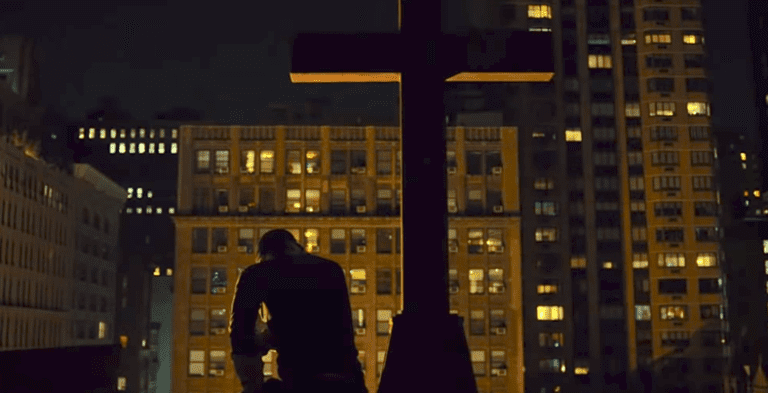
The third season of Netflix’s Daredevil begins with a black baptism.
Its first few seconds give us a broiling mass of fire and water, the aftermath of last year’s Defenders finale. In that finale Matt Murdock, a.k.a. Daredevil, helped once again to save New York (with a little help from his friends), but everyone thought he died in the process. He and villain/hero/girlfriend Electra were buried underneath a mountain of rubble, and surely both were dead and gone.
Not so fast: Matt falls through the hellish soup, and is finally flushed out of the wreckage, practically but not-quite dead. Not yet.
It sets the table for season three beautifully. Beating people to a bloody pulp is secondary this time ‘round: This time, it’s all about the soul.
Granted, Netflix’s Daredevil has always been one of television’s most spiritual programs. It goes with the character. Daredevil has long been Catholic in the Marvel universe, and the whole Netflix series opened with Matt giving confession to Father Lantom, one of his closest confidantes and spiritual advisors. Writes Slate’s Charles Moss: “Murdock’s real superpower, and also his biggest foe, is his Catholicism.”
And boy, is that true in season three: In fact, he spends more time fighting his faith here than Wilson Fisk.
We know that Matt’s spirituality is going to be severely tested from the outset (in an episode titled, by the way, “Resurrection”). That dark baptism of fire and water.
Baptism’s the most important rite in Christianity. In some traditions (like the Catholic one that Matt is a part of), it’s usually done when adherents are still babies, where some holy water is poured on the infant’s head. In others—like the one I was baptized in—it’s a bit more dramatic. You step into a body of water, be it a river or a swimming pool or a specially built baptismal, and you’re fully submerged. Either way, baptism is chock full of symbolism: When we’re submerged, we symbolically “die” to our old life and old ways, and when we pop out of the water, we’re “born again,” in the lingo of my Baptist forebears.
Matt’s opening-episode baptism takes a bleaker turn, though. As he falls through the water to the camera, he takes on a Christ-like pose (altogether fitting for his sacrificial act in the Defenders), but he’s upside-down, and anyone who has watched a supernatural horror flick lately knows that’s never a good sign. The water is filled with explosions and lava-like remnants of building—looking more like a flaming lake from Revelations than the river Jordan.
He pops out of that miasma alive, and he indeed comes out a different man—but a lesser one, not greater. The blind superhero complains that his superhuman ability to hear and sense things is gone now: For the first time in a long time, he feels truly blind.
I find it really interesting that, in the first couple of episodes, he says that he feels as though he’s “under water.” It’s as if he never popped out of the baptism’s metaphorical death into new life. Part of him is dead.
But Matt’s experience did change him. He did die, in a way—to good old Matt Murdock. He pushes away from his friends, turns his back on the faith that supported him for so many years. When he talks to Sister Maggie Grace, the no-nonsense nun who helped raise him as an orphan, Matt compares himself to Job, God’s long-suffering, mistreated servant. But he’s different than Job, because he’s ready to curse God.
“I gave my seat and blood and skin without complaint,” he tells Sister Maggie, “because I too believed I was God’s soldier. Well, not anymore. I am what I do in the dark now. I bleed only for myself.”
That’s critical: When Matt fought for God, he swore to never take a life—a critical tenant for who he was and why he was a hero. This season, he’s ready to set that aside. [Caution: several spoilers for the show to follow.]













